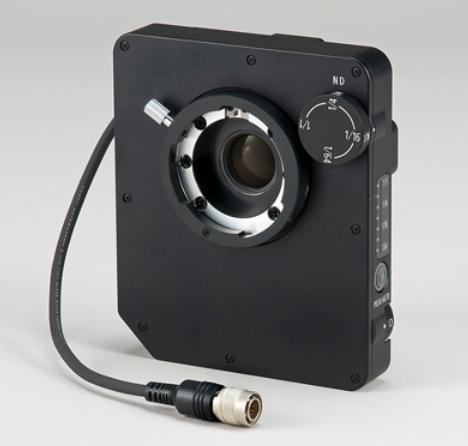
It allows to keep PV going, with more focus towards AI, but keeping be one of the few truly independent places.
-
FUJINON ND-P01 Optical Variable ND Filter


Via: http://cinescopophilia.com/fujinon-nd-p01-optical-variable-nd-filter/
Text is quite bumpy, but main idea is that bu turning two gradient wheels in opposite direction you can get even ND from 90% transparancy up to 1/64 original light only.
And no cross and color shift issues associated with reverse poliriser filters. :-)

 FUJINON-ND-P01-Adapter.jpg468 x 446 - 17K
FUJINON-ND-P01-Adapter.jpg468 x 446 - 17K
 Fujinon-ND-PO1.jpg885 x 247 - 28K
Fujinon-ND-PO1.jpg885 x 247 - 28K -
Very interesting idea indeed, however I'm having a bit of trouble believing the gradients on both wheels add up uniformly. I don't doubt my geometry can be seriously flawed, but my intuition tells me there is going to be some "vignetting". :(
-
intuition tells me there is going to be some "vignetting". :(
What kind of vignetting?
-
Ah, forget it. I wasn't thinking straight. The 3D representation fooled me because I wasn't imagining the stacking of the gradients correctly with their centers on the same axis (light path axis).
The yellow arrow is on the right spot, you can only use the top half of the filters because the way they are represented (perfectly aligned) they will be uniform on all the filter (top & bottom) but as soon as they start rotating in the black arrow direction it will become darker on top (yellow arrow zone) but it will become lighter on the bottom and the discrete transition from black to white would immediately show a pattern.
It makes perfect sense now. It's a great invention, the only drawback I see is that the diameter of the filter has to be at least twice the size of a similar VND. Well worth the advantages (light transmission up to 90%).
-
The other very important advantage is avoiding polarizers, as Vitaliy wrote. Apart from the cross or color shifts, they can have nasty effects on windshields or similar tempered glass. Plus, sometimes you just want to keep those reflections which are usually suppressed by them.
Very interesting indeed!
-
@nomad Thanks for the extra input.
I didn't knew about those other issues, I rarely have gone into trouble even with cheaps VND (perhaps because I rarely use them). The cross effect only shows when I'm using it at the maximum. Now, 25% light transmission against 90% that's decisive. :)
-
i dont understand why it needs external power... would be cool if they would have the same system as a mount for MFT/M43
Howdy, Stranger!
It looks like you're new here. If you want to get involved, click one of these buttons!
Categories
- Topics List23,970
- Blog5,724
- General and News1,346
- Hacks and Patches1,153
- ↳ Top Settings33
- ↳ Beginners255
- ↳ Archives402
- ↳ Hacks News and Development56
- Cameras2,360
- ↳ Panasonic990
- ↳ Canon118
- ↳ Sony155
- ↳ Nikon96
- ↳ Pentax and Samsung70
- ↳ Olympus and Fujifilm100
- ↳ Compacts and Camcorders300
- ↳ Smartphones for video97
- ↳ Pro Video Cameras191
- ↳ BlackMagic and other raw cameras117
- Skill1,961
- ↳ Business and distribution66
- ↳ Preparation, scripts and legal38
- ↳ Art149
- ↳ Import, Convert, Exporting291
- ↳ Editors191
- ↳ Effects and stunts115
- ↳ Color grading197
- ↳ Sound and Music280
- ↳ Lighting96
- ↳ Software and storage tips267
- Gear5,414
- ↳ Filters, Adapters, Matte boxes344
- ↳ Lenses1,579
- ↳ Follow focus and gears93
- ↳ Sound498
- ↳ Lighting gear314
- ↳ Camera movement230
- ↳ Gimbals and copters302
- ↳ Rigs and related stuff272
- ↳ Power solutions83
- ↳ Monitors and viewfinders339
- ↳ Tripods and fluid heads139
- ↳ Storage286
- ↳ Computers and studio gear560
- ↳ VR and 3D248
- Showcase1,859
- Marketplace2,834
- Offtopic1,319





